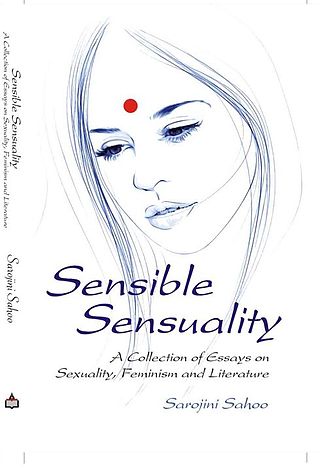
The sexual revolution, also known as the sexual liberation, was a social movement that challenged traditional codes of behavior related to sexuality and interpersonal relationships throughout the developed Western world from the 1960s to the 1970s. Sexual liberation included increased acceptance of sex outside of traditional heterosexual, monogamous relationships. The normalization of contraception and the pill, public nudity, pornography, premarital sex, homosexuality, masturbation, alternative forms of sexuality, and the legalization of abortion all followed.
Sexual themes are frequently used in science fiction or related genres. Such elements may include depictions of realistic sexual interactions in a science fictional setting, a protagonist with an alternative sexuality, a sexual encounter between a human and a fictional extraterrestrial, or exploration of the varieties of sexual experience that deviate from the conventional.

A sexual fantasy or erotic fantasy is an autoerotic mental image or pattern of thought that stirs a person's sexuality and can create or enhance sexual arousal. A sexual fantasy can be created by the person's imagination or memory, and may be triggered autonomously or by external stimulation such as erotic literature or pornography, a physical object, or sexual attraction to another person. Anything that may give rise to sexual arousal may also produce a sexual fantasy, and sexual arousal may in turn give rise to fantasies.

The History of Sexuality is a four-volume study of sexuality in the Western world by the French historian and philosopher Michel Foucault, in which the author examines the emergence of "sexuality" as a discursive object and separate sphere of life and argues that the notion that every individual has a sexuality is a relatively recent development in Western societies. The first volume, The Will to Knowledge, was first published in 1976; an English translation appeared in 1978. The Use of Pleasure, and The Care of the Self, were published in 1984. The fourth volume, Confessions of the Flesh, was published posthumously in 2018.
Sex-positive feminism, also known as pro-sex feminism, sex-radical feminism, or sexually liberal feminism, is a feminist movement centering on the idea that sexual freedom is an essential component of women's freedom. They oppose legal or social efforts to control sexual activities between consenting adults, whether they are initiated by the government, other feminists, opponents of feminism, or any other institution. They embrace sexual minority groups, endorsing the value of coalition-building with marginalized groups. Sex-positive feminism is connected with the sex-positive movement. Sex-positive feminism brings together anti-censorship activists, LGBT activists, feminist scholars, producers of pornography and erotica, among others. Sex-positive feminists believe that prostitution can be a positive experience if workers are treated with respect, and agree that sex work should not be criminalized.

LGBT themes in speculative fiction include lesbian, gay, bisexual, or transgender (LGBTQ) themes in science fiction, fantasy, horror fiction and related genres.[a] Such elements may include an LGBT character as the protagonist or a major character, or explorations of sexuality or gender that deviate from the heteronormative.

Fear of Flying is a 1973 novel by Erica Jong. It became controversial for its portrayal of female sexuality, and figured in the development of second-wave feminism.
Nancy Colbert Friday was an American author who wrote on the topics of female sexuality and liberation. Her writings argue that women have often been reared under an ideal of womanhood, which was outdated and restrictive, and largely unrepresentative of many women's true inner lives, and that openness about women's hidden lives could help free women to truly feel able to enjoy being themselves. She asserts that this is not due to deliberate malice, but due to social expectation, and that for women's and men's benefit alike it is healthier that both be able to be equally open, participatory and free to be accepted for who and what they are.
Nancy Julia Chodorow is an American sociologist and professor. She began her career as a professor of Women's Studies at Wellesley College in 1973, and from 1974 on taught at the University of California, Santa Cruz, until 1986. She then was a professor in the departments of Sociology and Clinical Psychology at the University of California, Berkeley until she resigned in 1986, after which she taught psychiatry at Harvard Medical School/Cambridge Health Alliance. Chodorow is often described as a leader in feminist thought, especially in the realms of psychoanalysis and psychology.

My Secret Garden: Women’s Sexual Fantasies is a 1973 book compiled by Nancy Friday, who collected women's fantasies through letters and tapes and personal interviews. After including a female sexual fantasy in a novel she submitted for publishing, her editor objected, and Friday shelved the novel. After other women began writing and talking about sex publicly, Friday began thinking about writing a book about female sexual fantasies, first collecting fantasies from her friends, and then advertising in newspapers and magazines for more. She organized these narratives into "rooms", and each is identified by the woman's first name, except for the last chapter, "odd notes", which is presented as the "fleeting thoughts" of many anonymous women. The book revealed that women fantasize, just as men do, and that the content of the fantasies can be as transgressive, or not, as men's. The book, the first published compilation of women's sexual fantasies, challenged many previously accepted notions of female sexuality.

Lesbianism is the sexual and romantic desire between women. There are historically fewer mentions of lesbianism than male homosexuality, due to many historical writings and records focusing primarily on men.

Simon LeVay is a British-American neuroscientist.

Sexual Politics is the debut book by American writer and activist Kate Millett, based on her PhD dissertation at Columbia University. It was published in 1970 by Doubleday. It is regarded as a classic of feminism and one of radical feminism's key texts, a formative piece in shaping the intentions of the second-wave feminist movement. In Sexual Politics, an explicit focus is placed on male dominance throughout prominent 20th century art and literature. According to Millett, western literature reflects patriarchal constructions and the heteronormativity of society. She argues that men have established power over women, but that this power is the result of social constructs rather than innate or biological qualities.

Lesbian literature is a subgenre of literature addressing lesbian themes. It includes poetry, plays, fiction addressing lesbian characters, and non-fiction about lesbian-interest topics. A similar term is sapphic literature, encompassing works that feature love between women that are not necessarily lesbian.

Feminization or feminisation, sometimes forced feminization, and also known as sissification, is a practice in dominance and submission or kink subcultures, involving reversal of gender roles and making a submissive male take on a feminine role, which includes cross-dressing. Subsets of the practice include "sissy training" and variations thereof, where the submissive male is "trained" to become feminine.
Zoophilia is a paraphilia in which a person experiences a sexual fixation on non-human animals. Bestiality instead refers to cross-species sexual activity between humans and non-human animals. Due to the lack of research on the subject, it is difficult to conclude how prevalent bestiality is. Zoophilia, however, was estimated in one study to be prevalent in 2% of the population in 2021.

Women on Top: How Real Life Has Changed Women's Sexual Fantasies is a 1991 book by Nancy Friday. In it she continues her research into women's sexual fantasies, following on from My Secret Garden and Forbidden Flowers. The book is divided into three sections: A "Report from the erotic interior", a section on masturbation, and the fantasies themselves. The fantasies in turn are divided into three chapters:
- Seductive, Sometimes Sadistic, Sexually Controlling Women
- Women With Women
- Insatiable Women: The Cry For "More!"
Joe Kort is an American psychotherapist, clinical social worker, board-certified clinical sexologist, author, lecturer and facilitator of therapeutic workshops. He works as Clinical Director and founder of The Center for Relationship and Sexual Health in Royal Oak, Michigan.
Jewish traditions across different eras and regions devote considerable attention to sexuality. Sexuality is the subject of many narratives and laws in the Tanakh and rabbinic literature.

Sensible and Sensuality is a collection of essay by Indian feminist writer Sarojini Sahoo. Published in 2010, the book contains the author's view on feminism. Sahoo is a key figure and trend-setter of feminism in contemporary Indian literature. She has been listed among 25 exceptional women of India by Kindle English magazine of Kolkata. For Sahoo, feminism is not a "gender problem" or confrontational attack on male hegemony and, as such, differs from the feminist views of Virginia Woolf or Judith Butler.












